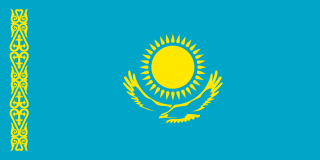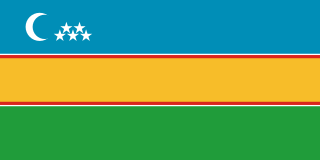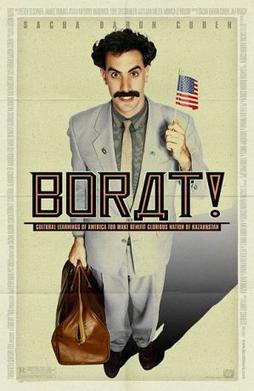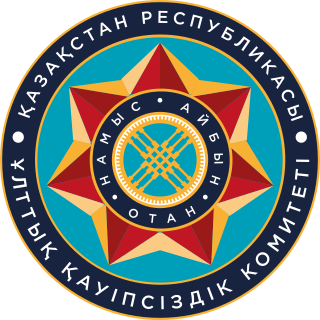Related Research Articles

Kazakhstan, officially the Republic of Kazakhstan, is a landlocked country mostly in Central Asia, with a part in Eastern Europe. It borders Russia to the north and west, China to the east, Kyrgyzstan to the southeast, Uzbekistan to the south, and Turkmenistan to the southwest, with a coastline along the Caspian Sea. Its capital is Astana, while the largest city and leading cultural and commercial hub is Almaty. Kazakhstan is the world's ninth-largest country by land area and the largest landlocked country. It has a population of 20 million and one of the lowest population densities in the world, at fewer than 6 people per square kilometre. Ethnic Kazakhs constitute a majority, while ethnic Russians form a significant minority. Officially secular, Kazakhstan is a Muslim-majority country, although ethnic Russians in the country form a sizeable Christian community.

Astana, formerly known as Nur-Sultan is the capital city of Kazakhstan.

Nursultan Abishuly Nazarbayev is a Kazakh politician who served as the first President of Kazakhstan, from the country's independence in 1991 until his formal resignation in 2019, and as the Chairman of the Security Council of Kazakhstan from 1991 to 2022.

Almaty, formerly Alma-Ata, is the largest city in Kazakhstan, with a population of over two million. It was the capital of Kazakhstan from 1929 to 1936, while the country was an autonomous republic of the Soviet Union, then from 1936 to 1991, a union republic and finally from 1991, an independent state. In 1997, the government relocated the capital to Akmola.

The Kazakhs are a Turkic ethnic group native to Central Asia and Eastern Europe, mainly Kazakhstan, but also parts of northern Uzbekistan and the border regions of Russia, as well as northwestern China and western Mongolia. The Kazakhs arose from the merging of the medieval tribes of Turkic and Mongolic origin in the 15th century.

The tenge is the currency of Kazakhstan. It is divided into 100 tiyn.

Karakalpakstan, officially the Republic of Karakalpakstan, is an autonomous republic of Uzbekistan. It spans the northwestern portion of Uzbekistan. Its capital is Nukus. Karakalpakstan has an area of 166,590 km2 (64,320 sq mi), and has a population of about 2 million people. Its territory covers the classical land of Khwarazm, which in classical Persian literature was known as Kāt (کات).

Kassym-Jomart Kemeluly Tokayev is a Kazakh politician and diplomat who has served as the President of Kazakhstan since 2019. Between 20 March and 12 June 2019, he served as acting president after the resignation of Nursultan Nazarbayev, who had been president for nearly three decades.
The mass media in Kazakhstan refers to mass media outlets based in Kazakhstan, a Central-Asian country that gained independence after the Dissolution of the Soviet Union, in 1991. The Constitution of Kazakhstan guarantees freedom of press, but privately owned and opposition media have been subject of censorship. In 2004 the International Federation of Journalists identified a "growing pattern" of intimidation of the media, and in 2012 several opposition media outlets were ordered to be shut down on charges of promoting "extremism".

Football Club Shakhter, commonly referred to as FC Shakhter Karagandy, is a professional football club based in Karagandy, Kazakhstan. They have been members of the Kazakhstan Premier League since its foundation in 1992. They have won the championship 3 times.

Borat! Cultural Learnings of America for Make Benefit Glorious Nation of Kazakhstan, or simply Borat, is a 2006 mockumentary black comedy film directed by Larry Charles and starring Sacha Baron Cohen. Baron Cohen plays the leading role of Borat Sagdiyev, a fictional Kazakhstani journalist who travels through the United States to make a documentary which features real-life interactions with Americans. Much of the film features unscripted vignettes of Borat interviewing and interacting with real-life Americans who believe he is a foreigner with little or no understanding of American customs. It is the second of four films built around Baron Cohen's characters from Da Ali G Show (2000–2004): the first, Ali G Indahouse, was released in 2002, and featured a cameo by Borat; the third, Brüno, was released in 2009; and the sequel to Borat, Borat Subsequent Moviefilm, was released in 2020.

The Kazakh Wikipedia is the Kazakh language edition of the free online encyclopedia Wikipedia, founded on 3 June 2002.
Malovodnoye is an ethnically Kazakh village in Almaty Region of south-eastern Kazakhstan. It is located in the Enbekshikazakh District, approximately 75 kilometres north-east of Almaty and midway between the larger settlements of Yevgenyevka and Yanaturmysh. Numerous clashes between Kazakhs and ethnic Chechens have broken out in the village, notably in March-April 2007.

The National Security Committee of the Republic of Kazakhstan is an intelligence agency in Kazakhstan founded on 13 July 1992. It primarily manages the Border Service of Kazakhstan, which conducts oversight over the international borders of Kazakhstan. The NSC also oversees the Arystan ('Lions') commando unit.

Football Club Aktobe, commonly referred to as FC Aktobe or simply Aktobe, is a professional football club based in Aktobe. They last played in the Kazakhstan Premier League, the highest level of Kazakh football. Formed as Aktyubinets in 1967, they became Aktobemunai in 1996, Aktobe in 1997, Aktobe-Lento in 2000 and finally Aktobe again in 2005. Their home ground is the 13,500 seat Central Stadium.
Irina Petrushova is a Russian journalist, founder and editor-in-chief of the weekly Respublika in Kazakhstan. After a series of stories exposing government corruption, her life was threatened and her paper firebombed. In 2002, she was awarded a CPJ International Press Freedom Award.

The Zhanaozen massacre took place in Kazakhstan's western Mangystau Region over the weekend of 16–17 December 2011. At least 14 protestors were killed by police in the oil town of Zhanaozen as they clashed with police on the country's Independence Day, with unrest spreading to other towns in the oil-rich oblys, or region. According to Amnesty International, the massacre was a stark illustration of the country's poor human rights record under President Nursultan Nazarbayev.
Oralgaisha Omarshanova was a Kazakh journalist. She worked for the paper Zakon i Pravosudiye, based in Astana. On 30 March she had secured a trip to Almaty Region to cover the clashes between Kazakhs and ethnic Chechens in the villages of Malovodnoye and Kazatkom, but never arrived. She had told a colleague previously that she had received threats by phone. She was last seen getting into a jeep in Almaty.
DAT is a Kazakh newspaper. Along with Altyn Tamyr and Tortinshi Bilik, it is an opposition news source. The newspaper fell into difficulties during the November 2012 case against media sources in Kazakhstan; its website dat.kz as of December 2012 is inaccessible. Ularbek Baitailaq, an archivist of the Kazakh National Archive, has contributed articles to the resource.
Ularbek Baitailaq is a Kazakh archivist and journalist. He is an employee of the Kazakh National Archive, and has contributed articles to the opposition papers DAT and Altyn Tamyr. In early August 2012 he was assaulted by four assailants and hospitalized.
References
- ↑ "Two journalists brutally beaten in Kazakh capital". Committee to Protect Journalists. 14 August 2012. Archived from the original on 4 January 2013. Retrieved 28 December 2012.
- ↑ "Kazakh journalist hospitalised after attack". International Press Institute. 9 August 2012. Archived from the original on 18 August 2012. Retrieved 28 December 2012.